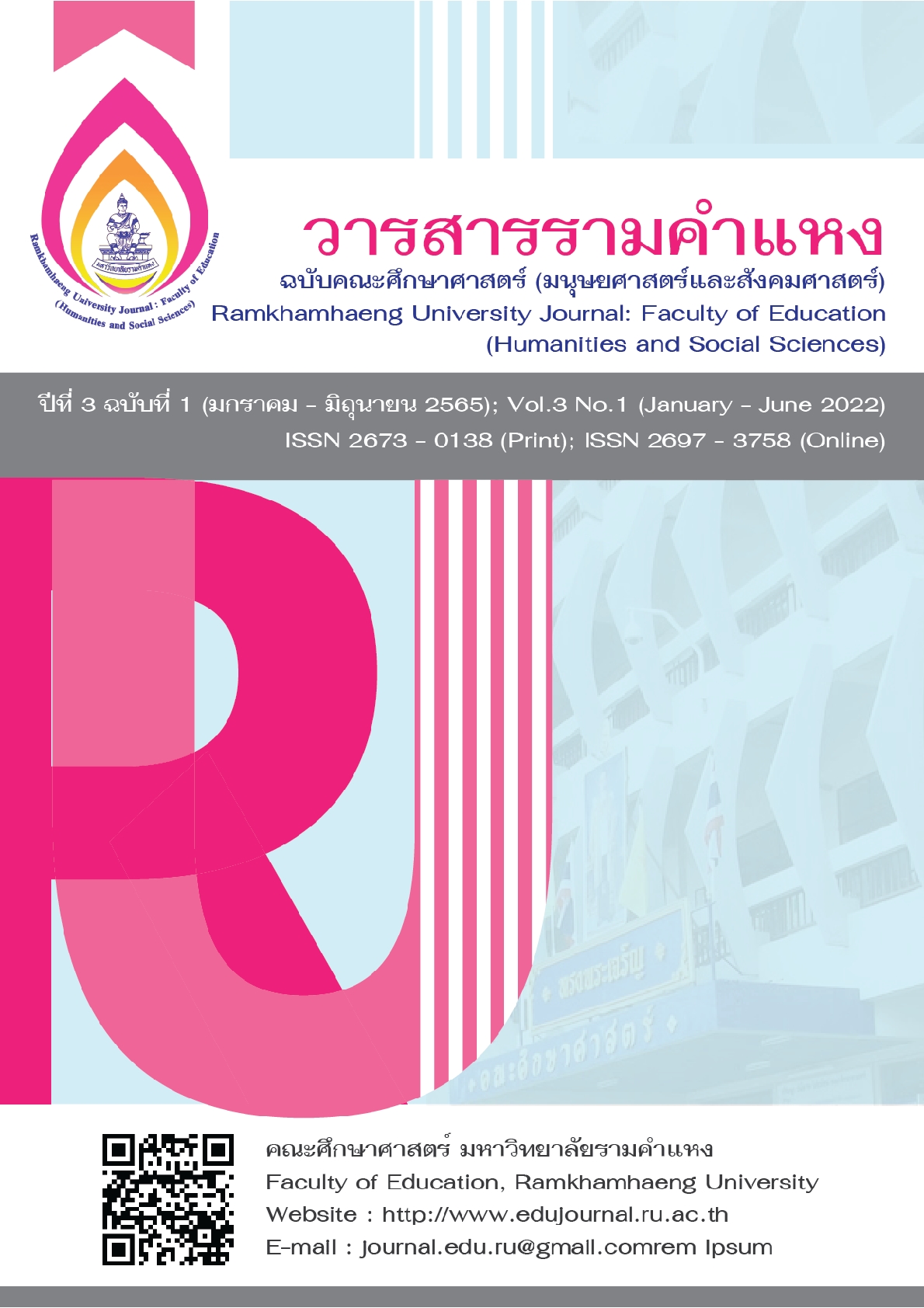การพัฒนารูปแบบการโค้ชเพื่อพัฒนาสมรรถนะการจัดการเรียนรู้ของครูผู้สอนที่ส่งเสริม ความสามารถในการรู้เท่าทันสื่อ ของนักเรียนระดับชั้นมัธยมศึกษาตอนปลาย
Main Article Content
บทคัดย่อ
การวิจัยครั้งนี้มีวัตถุประสงค์เพื่อ 1) พัฒนารูปแบบการโค้ชเพื่อพัฒนาสมรรถนะการจัดการเรียนรู้ให้กับ ครูผู้สอนที่ส่งเสริมความสามารถในการรู้เท่าทันสื่อของนักเรียนระดับชั้นมัธยมศึกษาตอนปลาย และ 2) ประเมิน ประสิทธิผลของรูปแบบการโค้ชฯ ดังกล่าว การวิจัยนี้เป็นการวิจัยและพัฒนา เก็บข้อมูลกับกลุ่มตัวอย่าง ได้แก่ ครู จำนวน 8 คน และนักเรียนระดับชั้นมัธยมศึกษาปีที่ 4/1 ประจำปีการศึกษา 2564 จำนวน 35 คน โดยอาศัยการสุ่ม อย่างง่าย จากนั้นวิเคราะห์ข้อมูลโดยการหาค่าเฉลี่ย ค่าเบี่ยงเบนมาตรฐาน การวิเคราะห์เนื้อหา และสถิติทดสอบค่าที ผลการวิจัย พบว่า 1) รูปแบบการโค้ชฯ ที่ได้รับการพัฒนามีรูปแบบเป็นการโค้ชไอซีไอซี (ICIE Coaching Model) ประกอบด้วยองค์ประกอบที่สำคัญ คือ หลักการ วัตถุประสงค์ และองค์ประกอบเชิงกระบวนการ โดยมีระยะเวลา ดำเนินการแบ่งเป็น 4 ระยะ ได้แก่ ระยะที่ 1 การเริ่มต้น (Initiation) ระยะที่ 2 การทำงานร่วมกัน (Cooperation) ระยะที่ 3 การสู่การปฏิบัติ (Implementation) และระยะที่ 4 การประเมินผล (Evaluation) ในขณะที่ 2) ผลการ ประเมินประสิทธิผลการใช้รูปแบบการโค้ชฯ มีข้อค้นพบที่สำคัญ คือ (2.1) สมรรถนะการจัดการเรียนรู้ของครูผู้สอนที่ ส่งเสริมความสามารถในการรู้เท่าทันสื่อสูงกว่าก่อนการทดลอง (2.2) นักเรียนมีความสามารถในการรู้เท่าทันสื่อสูงขึ้น กว่าก่อนเรียนอย่างมีนัยสำคัญที่ระดับ 0.05 (2.3) นักเรียนมีความพึงพอใจต่อการจัดการเรียนรู้ของครูที่ได้รับรูปแบบ การโค้ชฯ ในระดับมาก (ค่าเฉลี่ย 4.21 ส่วนเยี่ยงเบนมาตรฐาน 0.53) และ (2.4) ครูที่ได้รับรูปแบบการโค้ชฯ มีความ พึงพอใจต่อรูปแบบการโค้ชฯ ในระดับมาก (ค่าเฉลี่ย 4.49 ส่วนเบียงเบนมาตรฐาน 0.57)
Downloads
Article Details

อนุญาตภายใต้เงื่อนไข Creative Commons Attribution-NonCommercial-NoDerivatives 4.0 International License.
ผู้ส่งบทความ (และคณะผู้วิจัยทุกคน) ตระหนักและปฎิบัติตามจริยธรรมการวิจัยอย่างเคร่งครัด ทั้งนี้บทความ เนื้อหา ข้อมูล ข้อความ ภาพ ตาราง แผนภาพ แผนผัง หรือข้อคิดเห็นใดๆ ที่ปรากฎในบทความ เป็นความคิดเห็นและความรับผิดชอบของผู้ส่งบทความ กองบรรณาธิการไม่จำเป็นต้องเห็นตามเสมอไป และไม่มีส่วนรับผิดชอบใดๆ โดยถือเป็นความรับผิดของของเจ้าของบทความเพียงผู้เดียว
เอกสารอ้างอิง
Chuenklin, T., & Laowreandee, W. (2012). The development of coaching model to enhance nursing instructors’ competency that promotes critical thinking skills of nursing students in praboromarachanok institute, ministry of public health. Silpakorn Educational Research Journal, 4(1), 112-129. (in Thai)
Costa, A., & Garmston, R. (2002). Cognitive coaching: A foundation for renaissance schools. New York: Christopher-Gordon Publishers.
Dick, W., Carey, L., & Carey, J. O. (2005). The systematic design of instruction (6th ed.). Boston: Pearson.
Joyce, B., & Weil, M., & Showers, B. (1992). Model of teaching (4th ed.). Boston: Allyn and Bacon.
Khammani, T. (2007). Pedagogical science (6th ed.). Bangkok: Dan Sutta printing. (in Thai) Kruse, K. (2007). Instruction to instructional design and the ADDIE model. Retrieved June 10, 2013, from http://www.e-learningguru.com/articles/art11.htm
Kunarak, K. (2002). Instructional design. Bangkok: Faculty of Education Silpakorn University (in Thai).
National Statistical Office. (2016). Executive summary: Use of information and communication technology. Bangkok: National Statistical Office. (in Thai).
Office of the National Economic and Social Development Board. (2017). Economic and social development plan national Issue No. 12 (2017 - 2021). Bangkok: Author. (in Thai).
Phattarasatjatum, P. et al. (2020). Development of an integrated social media and technology based coaching model for developing early childhood healthcare competencies of caregivers in local administration organization childcare centers. Journal of The Royal Thai Army Nurses, 22(3), 123-134. (in Thai)
Rodsin, P., Lemjinda, M., & Otjanalert, N. (2020). The development of a learning management model for secondary school Thai language teachers to enhance analytical reading thinking skills by using metacognition strategies with coaching. Journal of Graduate Studies and Social Sciences, Uttaradit Raja Bhat University, 10(1), 16-27. (in Thai).
Sripairote, T., Sombatwattana, P., & Yoelao, D. (2018). Influence of project-based learning coaching program on teacher competency. Veridian E-Journal, Silpakorn University, 11(2), 96-110. (in Thai).
Thien Thai, J. (2020). Impact of social media Towards changes in Thai society and culture. Retrieved June 10, 2013, from https://www.chula.ac.th/news/27969/
United Nations Educational, Scientific and Cultural Organization (UNESCO). (2013) . Intangible cultural heritage domains. Retrieved June 10, 2013, from http://www.unesco.org/culture/ich/doc/src/01857-EN.pdf
Whitmore, J. (2017). Coaching for performance. London: Nicholas Brealey. Wongyai, W.. & Phatphon, M. (2014). Coaching for cognition (3rd ed.). Bangkok: Charansanitwong. (in Thai).
Zwart, R. C. et al. (2008). Teacher learning through reciprocal peer coaching: An analysis of activity sequences. Teaching and Teacher Education, 24, 981-1002.


